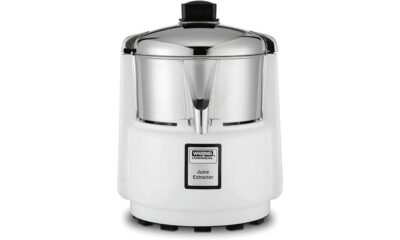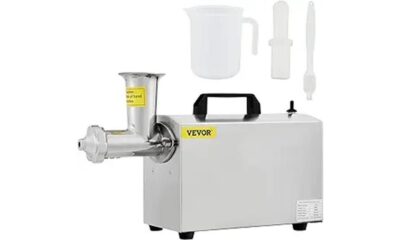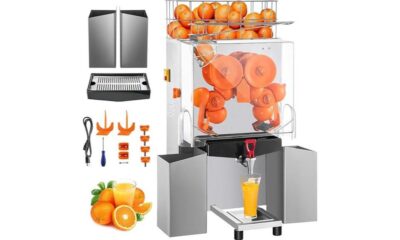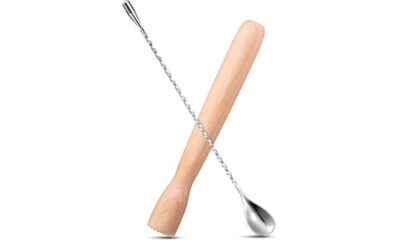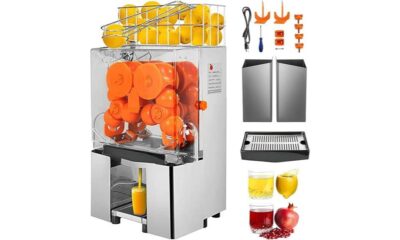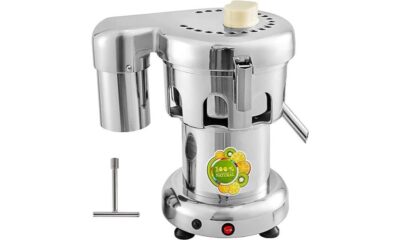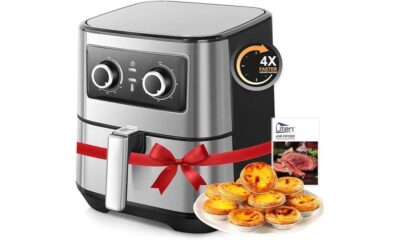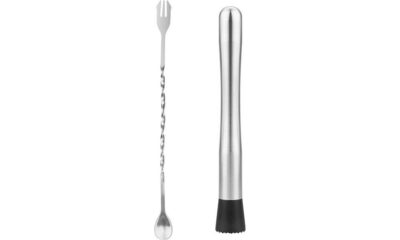Coffee Roasting
How To Measure Temerature When Coffee Roasting
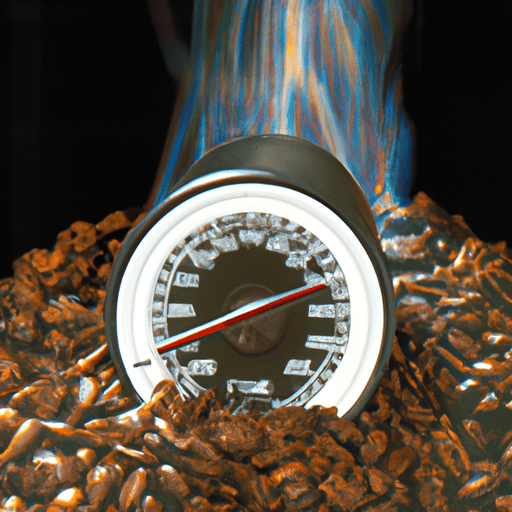
Oh, the joys of coffee roasting! The aroma, the flavor, the science! And let’s not forget the thrill of measuring the temperature during the roasting process. It’s almost like a game of cat and mouse, except the mouse is the coffee and the cat is the roaster trying to control the temperature.
But fear not, my fellow roasters, for I have some tips and tricks to help you measure temperature like a pro.
Temperature control is crucial in coffee roasting because it affects the flavor, aroma, and color of the coffee beans. If the temperature is too low, the beans won’t roast properly, resulting in a sour taste. On the other hand, if the temperature is too high, the beans will burn, resulting in a bitter taste. That’s why measuring the temperature accurately and consistently is essential for achieving the perfect roast.
So, let’s dive into the different temperature measurement techniques and how to choose the right one for your roasting setup.
Key Takeaways
- Accurate and consistent temperature measurement is crucial for achieving the desired flavor, aroma, and color of coffee beans during roasting.
- Different temperature profiles can result in different roast developments, affecting the overall taste and quality of the coffee.
- The choice of temperature measurement technique should be based on factors such as the type of roaster, size of roasting batch, and level of precision required.
- Monitoring temperature fluctuations, adjusting temperature accordingly, and ensuring proper airflow, stirring, and cleaning are all important for achieving a consistent and high-quality roast.
The Importance of Temperature Control in Coffee Roasting
You can’t roast coffee without paying attention to temperature control – it’s like trying to drive a car blindfolded on a winding road. Temperature profiles are crucial in coffee roasting as they determine the flavor and aroma of the finished product.
Different temperature profiles can result in different roast developments, which can make a significant difference in the cup. Roast development refers to the transformation of green coffee beans into roasted coffee. This transformation involves a series of chemical reactions that are influenced by temperature.
Therefore, controlling the temperature during the roasting process is crucial. Understanding the different temperature measurement techniques is essential to ensure that the beans are roasted to perfection.
Understanding the Different Temperature Measurement Techniques
As a coffee roaster, I’ve found that understanding the different temperature measurement techniques is crucial for achieving consistent and high-quality roasts.
There are several methods for measuring temperature in coffee roasting, including thermocouples, infrared temperature guns, probe thermometers, and data loggers.
Each technique has its own advantages and limitations, and choosing the right one depends on factors such as roast size, equipment, and budget.
Thermocouples
Using thermocouples is a common method for measuring temperature during coffee roasting, as they provide accurate and real-time data.
Thermocouples consist of two wires made of different metals that are joined at one end, and when heat is applied, it creates a voltage that can be measured. These wires can be placed in various locations inside the roasting chamber, such as the exhaust duct or the bean mass, to provide temperature readings at different points in the roasting process.
It’s important to calibrate thermocouples regularly to ensure accurate readings. Calibration involves comparing the readings from the thermocouple to a known standard temperature, and adjusting the readings if necessary. Calibration should be done at least once a year, or more often if the thermocouple is frequently exposed to extreme temperatures or if it’s dropped or damaged.
Moving onto the subsequent section about infrared (IR) temperature guns, they are another popular method for measuring temperature during coffee roasting.
Infrared (IR) Temperature Guns
Get ready to explore a different method that can give you real-time data on your roast – the infrared (IR) temperature gun! IR temperature guns are non-contact devices that measure temperature by detecting the infrared energy emitted from an object.
They’re commonly used in coffee roasting because they provide a quick and easy way to measure the temperature of the coffee beans during the roasting process. One of the advantages of using IR temperature guns is their speed and accuracy. They can measure the temperature of coffee beans from a distance, which means you can avoid opening the roaster and losing heat.
Also, IR temperature guns can provide accurate temperature readings within a range of ±2°F or ±1% of the reading, whichever is greater. However, there are also some cons to using IR temperature guns. The accuracy of the measurements can be affected by the surface of the coffee beans, the color of the beans, and the distance between the beans and the IR temperature gun.
Therefore, it’s important to use an IR temperature gun properly and calibrate it regularly to ensure accurate readings. Moving on to the next section about ‘probe thermometers’, another method commonly used by coffee roasters is the use of probe thermometers to measure the temperature of the coffee beans.
Probe Thermometers
One popular tool for monitoring the progress of a coffee roast involves inserting a probe thermometer into the bean mass. Probe thermometers are widely used in the coffee industry due to their accuracy and ease of use. They consist of a metal probe attached to a digital display that shows the temperature reading.
Using probe thermometers for temperature measurement requires proper calibration techniques. Calibration ensures that the thermometer is accurate and reliable. One common method is to use a calibrated reference thermometer to compare readings with the probe thermometer. If there is a difference, the probe thermometer can be adjusted accordingly. With proper calibration, probe thermometers provide precise temperature readings during coffee roasting, allowing roasters to make informed decisions about the roast profile.
Moving on to the next section about data loggers, I will describe another useful tool for measuring temperature during coffee roasting.
Data Loggers
Data loggers are a valuable tool for tracking the progress of a roast, providing a detailed record of temperature fluctuations over time. These devices are designed to measure and record temperature data at set intervals, allowing you to view a graph of the temperature changes throughout the roasting process.
With wireless connectivity, you can even monitor the temperature remotely, making it easier to manage the roasting process from a distance.
When choosing a data logger, it’s important to consider the battery life, as some models have a limited battery life and need to be recharged frequently. Additionally, it’s important to choose a model that is compatible with your roasting setup, as some data loggers may not work with certain types of roasting equipment.
By selecting the right data logger and setting it up properly, you can gain valuable insights into the roasting process and improve the quality of your coffee.
Choosing the right temperature measurement technique for your roasting setup involves considering a variety of factors, such as the type of roaster you’re using, the size of your roasting batch, and the level of precision you require.
Choosing the Right Temperature Measurement Technique for Your Roasting Setup
To ensure the perfect roast, you need to consider which temperature measurement technique is best suited for your setup. One of the most common methods is using thermocouples, but it’s important to calibrate them regularly to maintain accuracy. Inaccurate readings can lead to under or over-roasting, which can result in undesirable flavors and aromas.
Comparing the accuracy of different temperature measurement techniques can help you make an informed decision about which method to use. Other options include infrared thermometers and probes. Infrared thermometers can be used to measure surface temperature, while probes can be inserted into the beans to track internal temperature.
Each method has its pros and cons, and the choice ultimately depends on the specific needs of your roasting setup. With the right technique, you can achieve a consistent roast profile that brings out the best flavors and aromas in your coffee beans.
Now, let’s talk about preparing your equipment for temperature measurement.
Preparing Your Equipment for Temperature Measurement
Get your gear ready by calibrating your equipment and preparing it for temperature measurement. This is essential to obtain accurate readings during coffee roasting.
Make sure to check the calibration of your thermocouples, clean your infrared thermometer lens, or replace old probes before taking temperature readings.
Record data by keeping detailed records of temperature readings throughout the roasting process. This will help you understand the roasting profile and make adjustments accordingly.
Additionally, check your data after each roasting session to ensure that your equipment is working properly. By calibrating your equipment and recording data, you can ensure that your temperature measurements are accurate and reliable.
When transitioning to monitoring temperature during the roasting process, it’s important to have a consistent method for taking readings at regular intervals.
Monitoring Temperature During the Roasting Process
As you roast your coffee, keeping a close eye on the temperature is crucial for achieving the desired roasting profiles. Measuring the bean temperature is the most reliable method of monitoring the roasting process. This can be done using a thermocouple or probe thermometer inserted into the coffee mass.
During the roasting process, the temperature will fluctuate and it’s important to take note of any changes in the readings. This allows you to make adjustments to the roasting profile to achieve the desired outcome. By being vigilant in monitoring the temperature, you can ensure that the coffee beans are roasted to perfection.
This leads us to the next step of adjusting the temperature for optimal roasting.
Adjusting Temperature for Optimal Roasting
Now that we know how to monitor temperature during the roasting process, let’s talk about adjusting temperature for optimal roasting. As a coffee roaster, I always strive to create consistent and delicious roasting profiles for my customers. Temperature plays a crucial role in flavor development, and by adjusting it, we can achieve the desired outcome.
Here are some tips on adjusting temperature for optimal roasting:
-
First, consider the type of coffee you’re roasting. Different beans require different roasting temperatures, so it’s essential to understand the characteristics of each type.
-
Second, pay attention to the color and aroma of the beans. If you notice uneven coloring or a burnt smell, adjust the temperature accordingly.
-
Third, keep track of your roasting profiles and make note of the temperature changes you make. This will help you create consistent roasts in the future.
By following these tips, you can adjust the temperature to achieve optimal roasting profiles and flavor development.
Now, let’s move on to troubleshooting temperature issues.
Troubleshooting Temperature Issues
When troubleshooting temperature issues during the roasting process, it’s important to take into consideration the equipment being used and any potential malfunctions that may occur. One common mistake is not properly calibrating the thermocouple or temperature probe. This can lead to inaccurate temperature readings, resulting in over or under-roasting the coffee.
Additionally, poor airflow can cause temperature fluctuations, particularly in larger roasters. To avoid this issue, make sure the roaster is clean and well-maintained, with all fans and vents functioning properly.
Another common temperature issue is the presence of hot spots in the roasting chamber. This can occur due to uneven distribution of heat, resulting in some beans roasting more quickly than others. To troubleshoot this issue, try stirring the beans more frequently or adjusting the airflow to ensure even heat distribution.
It’s also important to pay attention to the roast profile and adjust the temperature accordingly, based on the desired roast level. By addressing these common temperature issues, you can ensure a consistent and high-quality roast.
To ensure optimal temperature control during coffee roasting, there are several tips and tricks to keep in mind. By monitoring the temperature closely throughout the roasting process, you can make adjustments as needed to achieve the desired roast level. Additionally, investing in high-quality equipment and regularly maintaining it can help prevent temperature issues from arising in the first place. By incorporating these strategies, you can improve your coffee roasting skills and produce consistently delicious coffee.
Tips and Tricks for Temperature Control
When roasting coffee, it’s important to have control over the temperature at all times. To achieve this, I always roast in batches to ensure consistency in temperature and roasting time.
By doing this, I’m able to produce high-quality coffee beans with a consistent flavor profile.
Roasting in Batches
Roasting coffee in batches is a piece of cake with the right equipment and a pinch of patience. Here are some batch size considerations and roasting time adjustments that have worked for me:
-
Start with small batches. It’s easier to control the temperature and airflow with small batches, especially when you’re still learning how to roast. I recommend starting with 100-200 grams of green coffee beans per batch.
-
Adjust your roasting time based on the batch size. The larger the batch, the longer it will take to roast. For example, a 100-gram batch may take 10-12 minutes to roast, while a 200-gram batch may take 12-15 minutes.
-
Keep an eye on the color of the beans. The color will give you a good indication of how well the beans are roasting.
-
Stop the roast when the beans reach your desired level of roast (light, medium, or dark).
-
Use a cooling tray or colander to cool the beans quickly after roasting. This will stop the roasting process and prevent the beans from over-roasting.
-
Clean your equipment between batches. This will ensure that there are no leftover coffee oils or debris that could affect the flavor of the next batch.
Consistency in temperature and roasting time is crucial for achieving the perfect roast. In the next section, I’ll discuss some tips for maintaining a consistent temperature and roasting time, even when roasting multiple batches.
Consistency in Temperature and Roasting Time
To ensure your coffee has a consistent flavor, it’s important to maintain a steady temperature and roasting time across all batches. This can be achieved through the use of roasting profiles that specify the temperature and roasting time for each batch. These profiles can be programmed into the roasting equipment to ensure consistency and accuracy.
Flavor development in coffee is directly related to the temperature and roasting time. If the temperature’s too high or the roasting time’s too long, the coffee can become burnt and bitter. Conversely, if the temperature’s too low or the roasting time’s too short, the coffee can be underdeveloped and lack flavor. Therefore, it’s important to monitor the temperature and roasting time closely to achieve the desired flavor profile.
Moving on to the subsequent section about the impact of temperature on coffee flavor, it’s important to understand how temperature affects the chemical reactions that occur during the roasting process.
The Impact of Temperature on Coffee Flavor
You might think that the temperature during coffee roasting doesn’t make much of a difference, but let me tell you, it can completely change the flavor profile of your coffee.
As a coffee roaster, I’ve come to understand the scientific approach to temperature’s effect on coffee flavor and how important it is to understand the role of roast profile in temperature management.
The temperature can affect the acidity, sweetness, and bitterness of the coffee, as well as the aroma and body. A higher temperature can lead to a faster roast, resulting in a darker bean with a more bitter taste. Meanwhile, a lower temperature can prolong the roast, resulting in a lighter bean with a more acidic taste.
It’s important to find the right balance in temperature to achieve the desired flavor profile. By experimenting with the temperature during coffee roasting, you can create a unique and delicious cup of coffee that truly stands out.
Frequently Asked Questions
What are some common mistakes to avoid when measuring temperature during coffee roasting?
As an experienced coffee roaster, I’ve learned that common mistakes when measuring temperature include not properly calibrating equipment, not taking multiple readings, and not accounting for external factors. Best practices involve consistent calibration, taking multiple readings, and considering external conditions.
How often should temperature be monitored during the roasting process?
Optimal frequency for temperature monitoring during coffee roasting depends on the roast profile and desired outcome. Probe placement is crucial for accurate readings. As an experienced roaster, I monitor temperature every 30 seconds to ensure consistency and avoid over-roasting.
Can temperature fluctuations during roasting have a significant impact on the final coffee flavor?
Temperature fluctuations during roasting can significantly impact the final coffee flavor due to their effect on bean chemistry. Comparing traditional vs modern roasting techniques can reveal the importance of precise temperature control in achieving desired flavor profiles.
What are some alternative methods for measuring temperature in coffee roasting besides using a thermometer?
As a coffee roaster, I rely on infrared thermometers and bean probes to measure temperature during the roasting process. These tools allow for precise and accurate temperature readings, ensuring the quality and consistency of my coffee.
How long should coffee beans be allowed to cool before measuring their temperature post-roasting?
I let my coffee beans cool for at least 5 minutes before measuring their temperature post-roasting. This allows for a more accurate measurement and prevents any residual heat from skewing the results during the cooling process.
Conclusion
In conclusion, temperature control is a crucial aspect of coffee roasting that shouldn’t be overlooked. By understanding the different temperature measurement techniques and choosing the right one for your setup, you can ensure that your coffee is roasted to perfection.
It’s also important to prepare your equipment properly and monitor the temperature throughout the roasting process to make necessary adjustments for optimal roasting. However, temperature issues can arise during the roasting process, and it’s important to troubleshoot and address them promptly.
With the right tips and tricks for temperature control, you can achieve the desired flavor in your coffee. Remember that temperature plays a significant role in the final taste of your coffee, so it’s essential to pay close attention to it throughout the roasting process.
As an experienced coffee roaster, I can attest to the fact that mastering temperature control is key to achieving the perfect cup of coffee.
Justin is a seasoned author, coffee and tea enthusiast, and an essential member of the Cappuccino Oracle team. With a keen appreciation for the complexities of coffee, coffee alternatives, and tea, Justin has dedicated his professional career to exploring these realms and sharing his insights with readers worldwide.
Justin’s immersion in the world of coffee, coffee alternatives, and tea began at a young age, kindling a passion that extended beyond mere consumption. This love for these beverages led him to combine his talent for writing with his devotion to coffee and tea, bringing him to Cappuccino Oracle as a dedicated author.
Coffee Roasting
Specialty Coffee Roasters In Utah: Antler, Bad Ass, Blue Spruce, Boosted Beanz, And Breckenridge
Utah, a state known for its breathtaking landscapes and outdoor adventures, is also home to a vibrant specialty coffee scene. Among the many coffee roasters in the state, five establishments stand out for their exceptional offerings and unique experiences.
Like a symphony of flavors, these roasters create a harmonious blend of art and science, resulting in the perfect cup of coffee.
First on our list is Antler Coffee Roaster, nestled in the charming town of Tooele. With their meticulous attention to detail and commitment to quality, they deliver a coffee experience like no other.
Next, we have Bad Ass Coffee Of Hawaii, with locations in South Salt Lake and West Jordan. Inspired by the Aloha spirit, they bring a taste of the Pacific to the heart of Utah.
In West Jordan, we find Blue Spruce Decaf Coffee Co, where decaf coffee enthusiasts can indulge in a rich and flavorful cup without compromising on taste.
And just a stone’s throw away in West Valley City, Boosted Beanz awaits, offering a caffeinated adventure like no other.
Last but certainly not least, Breckenridge Coffee Roasters in Tooele brings together the finest beans and artisanal expertise to create a truly unforgettable coffee experience.
Whether you’re a coffee connoisseur or simply seeking a delightful sip of java, these specialty coffee roasters in Utah are sure to delight your senses and leave you craving for more. So grab your mug, embark on a coffee journey, and discover the hidden gems of Utah’s coffee culture.
Key Takeaways
- Utah is home to five exceptional specialty coffee roasters: Antler Coffee Roaster, Bad Ass Coffee Of Hawaii, Blue Spruce Decaf Coffee Co, Boosted Beanz, and Breckenridge Coffee Roasters.
- Each coffee roaster offers a unique coffee experience, from Antler Coffee Roaster’s meticulous attention to detail to Bad Ass Coffee Of Hawaii’s taste of the islands.
- Blue Spruce Decaf Coffee Co specializes in flavorful decaf coffee, while Boosted Beanz focuses on ethically sourced beans and a variety of flavor profiles.
- Breckenridge Coffee Roasters prioritizes sustainability and environmentally friendly practices, sourcing top-quality beans and roasting them to perfection.
Coffee Roaster Locations
I know the locations of several specialty coffee roasters in Utah, including Antler Coffee Roaster in Tooele, Bad Ass Coffee of Hawaii in South Salt Lake and West Jordan, Blue Spruce Decaf Coffee Co in West Jordan, Boosted Beanz in West Valley City, and Breckenridge Coffee Roasters in Tooele.
Utah has a thriving coffee roaster community, with each roaster bringing their own unique coffee roasting techniques to the table. Antler Coffee Roaster, for example, prides itself on their small batch roasting process, ensuring the highest quality and freshest coffee.
Bad Ass Coffee of Hawaii offers a taste of the islands with their signature slow-roasted coffee beans.
Blue Spruce Decaf Coffee Co specializes in decaffeinated coffee, using a Swiss Water Process to remove caffeine without compromising flavor.
Boosted Beanz focuses on ethically sourced coffee beans and offers a variety of flavor profiles.
Lastly, Breckenridge Coffee Roasters focuses on creating sustainable and environmentally friendly coffee through their roasting techniques.
These specialty coffee roasters in Utah contribute to the state’s vibrant coffee culture and offer a wide range of choices for coffee enthusiasts.
Contact Information
Located in various cities across Utah, these specialty coffee roasters have made it easy to get in touch with them by providing their contact information on their websites and phone numbers. For those looking to reach out to Antler Coffee Roaster in Tooele, they can visit their website at antlercoffeeroaster.com or call them at 661-304-8005.
Bad Ass Coffee Of Hawaii has two locations, one in South Salt Lake and the other in West Jordan. Their website, badasscoffee.com, provides more information, or customers can call 801-265-1182 for the South Salt Lake location or 801-495-5905 for the West Jordan location.
Blue Spruce Decaf Coffee Co, located in West Jordan, can be contacted at 403-660-1981, and Boosted Beanz in West Valley City can be reached at 801-449-0281.
Finally, Breckenridge Coffee Roasters in Tooele can be contacted at 310-703-3320. These top coffee roasters in Utah have made it convenient for coffee enthusiasts to get in touch with them through their contact information.
Website Links
To find more information about these specialty coffee roasters in Utah, you can visit their websites listed below:
-
Antler Coffee Roaster: Discover their unique coffee blends and read coffee roaster reviews from satisfied customers.
-
Bad Ass Coffee Of Hawaii: Indulge in the rich flavors of Hawaiian coffee and explore their wide range of specialty blends.
-
Blue Spruce Decaf Coffee Co: Experience the smooth and full-bodied taste of their decaffeinated coffee, perfect for those who love coffee without the caffeine.
-
Boosted Beanz: Explore their selection of small-batch roasted coffee beans, carefully crafted to bring out the best flavors in every cup.
-
Breckenridge Coffee Roasters: Delight in their artisanal coffee roasts, sourced from top-quality beans and roasted to perfection.
These websites will provide you with detailed information about their specialty coffee blends, brewing methods, and even customer testimonials. Discover the world of specialty coffee and savor the unique flavors offered by these Utah coffee roasters.
Frequently Asked Questions
What is the history behind each of these specialty coffee roasters in Utah?
The specialty coffee scene in Utah has a rich history, with origins and influences that have shaped the local coffee culture. Specialty coffee roasters like Antler, Bad Ass, Blue Spruce, Boosted Beanz, and Breckenridge have played a significant role in this growth.
Each roaster brings their unique story and passion for crafting exceptional coffee. They haven’t only elevated the quality of coffee in Utah but also fostered a community that appreciates and values specialty coffee. Their dedication has had a lasting impact on the local coffee culture.
How do these coffee roasters source their beans and ensure quality?
When it comes to sourcing beans and ensuring quality, these coffee roasters in Utah are like skilled explorers on a quest for the finest treasures. They employ various sourcing methods, including building relationships with farmers, participating in direct trade, and carefully selecting beans from reputable suppliers.
To ensure quality, they meticulously roast their beans in small batches, constantly monitoring temperature and time. Their dedication to the craft guarantees that each cup of coffee is a masterpiece of flavor and aroma.
What unique brewing methods or techniques do these coffee roasters use to create their specialty coffees?
Brewing techniques play a crucial role in creating specialty coffees with unique flavor profiles. Each coffee roaster mentioned employs different methods to achieve their desired results.
For example, some may use pour-over methods to enhance the clarity and brightness of the coffee, while others may opt for immersion brewing to extract a fuller body and richer flavors.
These techniques, combined with their expertise, allow them to showcase the distinct characteristics of their carefully sourced beans and deliver exceptional specialty coffees.
Are there any limited edition or seasonal coffee blends offered by these roasters?
Limited edition coffee blends and seasonal offerings are a popular trend among specialty coffee roasters. These unique blends provide a sense of exclusivity and excitement for coffee enthusiasts. Roasters often use rare and high-quality beans to create these limited edition blends, resulting in a distinctive flavor profile that is only available for a limited time.
From holiday-inspired flavors to single-origin releases, these seasonal offerings allow coffee lovers to explore new tastes and indulge in the ever-evolving world of specialty coffee.
Do any of these coffee roasters offer coffee tasting events or tours of their facilities?
Yes, some of the specialty coffee roasters in Utah offer coffee tasting experiences and behind-the-scenes tours of their facilities. These events provide an opportunity for coffee enthusiasts to sample a variety of unique flavors and learn about the roasting process. Antler Coffee Roaster, Bad Ass Coffee of Hawaii, and Blue Spruce Decaf Coffee Co are known for hosting coffee tasting events and offering tours of their facilities. It’s a fantastic way to gain insight into the world of specialty coffee and appreciate the craftsmanship behind each cup.
Arf, an author and an innovative enthusiast of coffee, coffee alternatives, and tea, plays a crucial role as a contributor to the esteemed Cappuccino Oracle platform. Renowned for his curiosity and passion for these captivating beverages, Arf has carved out a unique space for himself in the world of exploration and writing. He realized that coffee, coffee alternatives, and tea are not mere drinks to keep one awake, but universes of flavors and stories waiting to be explored.
Arf’s articles for Cappuccino Oracle blend meticulous research with personal experiences, providing readers with an in-depth understanding of various types of coffee, coffee alternatives, and tea, along with their unique characteristics, cultures, and histories. His honest reviews and engaging narratives guide readers on their own journeys, helping them discover their preferences and find their perfect brew.
Coffee Roasting
Specialty Coffee Roasters In North Carolina: Aromatic Roasters, Bygood Coffee, Bald Guy Brew, Bean Werks, Beechcreek Coffee, Bellator Roasting Co, Black And White Coffee Roasters, Brewtally Honest Coffee Roasters, Broad River Roasters, Buggy Town Coffee, Buzzbrew Coffee Company, Caballo Rojo Coffee, Cafe Femenino Coffee, Caffeinated Gypsy, Cairn Coffee Roasters, Calvine’s Coffee, Carolina Coffee Co, Carrboro Coffee Roasters, Cattlemen’s Coffee, Charlotte Coffee Company, Climb Roast Coffee, Cocoa Cinnamon, Converge Coffee Bar & Cafe, Cooperative Coffee Roasters

Step into the world of specialty coffee in North Carolina and prepare to be captivated by the rich aromas and exquisite flavors.
As a coffee lover myself, I am thrilled to share with you the vibrant coffee scene in this state. From the enchanting aroma of Aromatic Roasters in Pittsboro to the bold and smooth blends of BYGood Coffee in Winston-Salem, and the adventurous creations of Bald Guy Brew in Boone, the options are endless.
Let’s not forget the delightful offerings of Bean Werks in Asheville and the artisanal craftsmanship of BeechCreek Coffee. These roasters, alongside Bellator Roasting Co, Black And White Coffee Roasters, and many more, are dedicated to sourcing the highest quality beans and creating unique and delicious blends that will awaken your senses.
Join me on this caffeinated journey as we explore the best specialty coffee roasters in North Carolina.
Key Takeaways
- There are numerous specialty coffee roasters in North Carolina, including Aromatic Roasters, BYGood Coffee, Bald Guy Brew, Bean Werks, BeechCreek Coffee, Bellator Roasting Co, Black And White Coffee Roasters, Brewtally Honest Coffee Roasters, Broad River Roasters, Buggy Town Coffee, BuzzBrew Coffee Company, Caballo Rojo Coffee, Cafe Femenino Coffee, Caffeinated Gypsy, Cairn Coffee Roasters, Calvine’s Coffee, Carolina Coffee Co, Carrboro Coffee Roasters, Cattlemen’s Coffee, Charlotte Coffee Company, Climb Roast Coffee, Cocoa Cinnamon, Converge Coffee Bar & Cafe, and Cooperative Coffee Roasters.
- Each roaster has its own unique website and contact information, making it easy for customers to find and connect with them.
- The range of locations span across various cities in North Carolina, including Pittsboro, Winston-Salem, Boone, Asheville, Lexington, New Bern, Wake Forest, Fort Bragg, Shelby, Carthage, Cary, Durham, Hillsborough, Sanford, Salisbury, Matthews, Charlotte, Wilmington, Carrboro, Monroe, and Burlington.
- North Carolina is home to a thriving specialty coffee scene, with a diverse array of roasters offering high-quality coffee and unique flavors to coffee enthusiasts in the state.
What is it?
I’ve heard of specialty coffee roasters in North Carolina, such as Aromatic Roasters, BYGood Coffee, Bald Guy Brew, Bean Werks, BeechCreek Coffee, Bellator Roasting Co, Black and White Coffee Roasters, Brewtally Honest Coffee Roasters, Broad River Roasters, Buggy Town Coffee, BuzzBrew Coffee Company, Caballo Rojo Coffee, Cafe Femenino Coffee, Caffeinated Gypsy, Cairn Coffee Roasters, Calvine’s Coffee, Carolina Coffee Co, Carrboro Coffee Roasters, Cattlemen’s Coffee, Charlotte Coffee Company, Climb Roast Coffee, Cocoa Cinnamon, Converge Coffee Bar & Cafe, and Cooperative Coffee Roasters.
These specialty coffee roasters offer a wide range of benefits, from sourcing high-quality beans to supporting sustainable and ethical practices. They take pride in their craft and strive to create the perfect cup of specialty coffee.
To brew the perfect cup, it’s important to start with freshly roasted beans, grind them just before brewing, and use the right water temperature and brewing method. Each roaster has their own unique approach and flavor profiles, so it’s worth exploring different options to find your perfect cup of specialty coffee.
Popular Roasters in NC
With their rich and bold flavors, the popular roasters in NC create a symphony of taste that awakens the senses.
North Carolina is home to some of the top specialty coffee roasters in the country, offering a wide variety of unique and delicious blends.
Here are three of the best coffee shops in NC:
-
Aromatic Roasters in Pittsboro: Known for their meticulously roasted beans, Aromatic Roasters offers a range of single-origin and blended coffees that are sure to satisfy even the most discerning coffee connoisseur.
-
Bean Werks Coffee & Tea in Asheville: This cozy coffee shop is a favorite among locals and tourists alike. Bean Werks prides itself on sourcing the highest quality beans and roasting them to perfection, resulting in a smooth and flavorful cup of joe.
-
Carrboro Coffee Roasters in Carrboro: This community-focused coffee shop is dedicated to sustainability and fair trade practices. Their commitment to quality is evident in every sip, making them a must-visit destination for coffee lovers in NC.
Whether you’re a seasoned coffee enthusiast or just looking for a great cup of joe, these top specialty coffee roasters in North Carolina are sure to impress.
Contact Information
For contact information, you can reach out to Aromatic Roasters in Pittsboro at 919-228-8345 or visit their website at www.aromaticroasters.com. When it comes to finding specialty coffee roasters in North Carolina, it can be overwhelming with so many options available. However, there are a few factors to consider when choosing the best one. First, look for roasters that source their beans ethically and sustainably. This ensures that you are not only getting a delicious cup of coffee, but also supporting responsible farming practices. Second, consider the roast level that suits your taste preferences. Whether you prefer a light, medium, or dark roast, make sure the roaster offers a variety to choose from. Lastly, during the pandemic, it’s important to support local businesses. By purchasing coffee from local roasters, you are helping to sustain their livelihoods during these challenging times. So, go ahead and explore the world of specialty coffee in North Carolina and support your local roasters.
Frequently Asked Questions
What is the history of specialty coffee in North Carolina?
Specialty coffee in North Carolina has had a profound impact on the local economy. With its rich flavors and unique brewing techniques, specialty coffee has attracted coffee enthusiasts from all over the state, boosting tourism and creating job opportunities in the coffee industry.
Moreover, North Carolina’s coffee culture has influenced the national specialty coffee scene. Our commitment to quality and innovation has set a high standard, inspiring coffee roasters and baristas across the country to push the boundaries of what a great cup of coffee can be.
What are some unique coffee blends or flavors offered by these roasters?
Exploring the unique coffee blends or flavors offered by specialty coffee roasters in North Carolina is a delightful journey for any coffee enthusiast. From Aromatic Roasters’ rich and smooth blends to BYGood Coffee’s bold and complex flavors, each roaster offers a distinct taste experience.
Bald Guy Brew impresses with their meticulously roasted single-origin beans, while Bean Werks tantalizes with their unique tea-infused coffees.
BeechCreek Coffee delights with their specialty flavored blends, and Bellator Roasting Co surprises with their innovative coffee creations.
With so many options, North Carolina is truly a coffee lover’s paradise.
Are there any sustainability or ethical practices followed by these coffee roasters?
Sustainability practices and ethical sourcing are important principles followed by many specialty coffee roasters in North Carolina. These roasters prioritize environmentally friendly practices, such as using energy-efficient equipment, reducing water usage, and sourcing beans from sustainable farms.
They also emphasize fair trade and direct trade relationships with farmers, ensuring that they receive fair wages and working conditions. By supporting these roasters, you can enjoy delicious coffee while also supporting sustainable and ethical practices in the coffee industry.
Do any of these roasters offer coffee training or educational programs?
Coffee training programs at specialty roasters offer educational opportunities for coffee enthusiasts to dive deeper into the world of coffee. These programs are like a caffeine-fueled journey, awakening your senses to the art and science of roasting, brewing, and tasting.
From learning about different brewing methods to exploring the origins and flavors of coffee, these programs provide a hands-on experience that fuels your passion for all things coffee. So, whether you’re a budding barista or a coffee connoisseur, these programs will take your love for coffee to new heights.
Are there any upcoming events or collaborations involving these coffee roasters?
Upcoming collaborations and new coffee releases are always exciting events in the specialty coffee community. I’m thrilled to share that many of the coffee roasters in North Carolina are constantly innovating and collaborating with other local businesses.
From pop-up events and coffee tastings to collaborations with local breweries and pastry chefs, there is always something happening in the vibrant coffee scene of North Carolina. Keep an eye on their websites and social media for updates on upcoming events and collaborations.
Arf, an author and an innovative enthusiast of coffee, coffee alternatives, and tea, plays a crucial role as a contributor to the esteemed Cappuccino Oracle platform. Renowned for his curiosity and passion for these captivating beverages, Arf has carved out a unique space for himself in the world of exploration and writing. He realized that coffee, coffee alternatives, and tea are not mere drinks to keep one awake, but universes of flavors and stories waiting to be explored.
Arf’s articles for Cappuccino Oracle blend meticulous research with personal experiences, providing readers with an in-depth understanding of various types of coffee, coffee alternatives, and tea, along with their unique characteristics, cultures, and histories. His honest reviews and engaging narratives guide readers on their own journeys, helping them discover their preferences and find their perfect brew.
Coffee Roasting
Specialty Coffee Roasters In New Mexico: A Guide

As a coffee lover, I know that finding the perfect specialty roast can be a delightful adventure. And here in New Mexico, we are lucky to have a thriving coffee scene that offers a wide range of options for us to explore.
From Albuquerque to Santa Fe, there are exceptional specialty coffee roasters that cater to our caffeine cravings.
Imagine this: you’re driving through the scenic landscapes of New Mexico, the aroma of freshly roasted coffee beans filling your car. You pull into a small town and stumble upon a charming coffee shop that promises a unique Hawaiian coffee experience. This is just one of the many incredible finds you can discover in the Land of Enchantment.
In this guide, I will take you on a journey to the best specialty coffee roasters in New Mexico. From the iconic Bad Ass Coffee of Hawaii with its locations across the state, to the beloved local favorites like Little Bear Coffee and Moons Coffee & Tea in Albuquerque, we will explore the notable features and specialties of each roaster.
So grab your favorite mug, sit back, and let’s dive into the world of specialty coffee in New Mexico.
Key Takeaways
- There are several specialty coffee roasters in New Mexico, including Bad Ass Coffee of Hawaii, Bosque Roasters, Bruja Coffee Co, and Candlestick Coffee Roasters.
- Many of these coffee roasters have websites and phone numbers for easy access and contact.
- Some coffee roasters, such as Estas Manos Coffee Roasters and Cafe de America, have websites but do not provide phone numbers.
- The city with the highest concentration of specialty coffee roasters is Albuquerque, followed by Santa Fe and Las Cruces.
Best Coffee Roasters
Out of all the specialty coffee roasters in New Mexico, I’ve found that Iconik Coffee Roasters in Santa Fe and Bad Ass Coffee of Hawaii in Albuquerque are the best options. Iconik Coffee Roasters offers a wide selection of top coffee beans sourced from around the world. Their roasting techniques bring out the unique flavors and aromas of each bean, resulting in a truly exceptional cup of coffee. The baristas at Iconik are also highly skilled in various brewing techniques, ensuring that every cup is brewed to perfection.
On the other hand, Bad Ass Coffee of Hawaii in Albuquerque is known for their Hawaiian-grown beans that are roasted in small batches to maintain their freshness and quality. Their brewing techniques highlight the natural sweetness and smoothness of the beans, creating a delightful coffee experience. Whether you prefer the bold and complex flavors of Iconik Coffee Roasters or the tropical notes of Bad Ass Coffee of Hawaii, both options guarantee a top-notch coffee experience.
Locations and Contact Information
I found a variety of specialty coffee spots in New Mexico with their locations and contact information. Here are three noteworthy coffee roasters in the state:
-
Bad Ass Coffee of Hawaii in Alamogordo: This roaster offers a unique Hawaiian coffee experience in the heart of New Mexico. You can find them at their website or reach them at their phone number.
-
Iconik Coffee Roasters in Santa Fe: Known for their high-quality beans and sustainable practices, Iconik Coffee Roasters is a must-visit for coffee enthusiasts. You can learn more about them at their website or give them a call.
-
Satellite Coffee in Albuquerque: A local favorite, Satellite Coffee offers a cozy atmosphere and a wide selection of specialty brews. For more information, visit their website or contact them via phone.
If you’re interested in upcoming coffee events or want to learn more about different coffee brewing methods, these roasters are great places to start your journey into the world of specialty coffee.
Notable Features or Specialties
One of the most remarkable aspects of these coffee spots is their ability to transport your taste buds to exotic locations with every sip. Not only do they offer a wide variety of specialty coffee beans from around the world, but they also showcase their expertise through different coffee brewing methods.
Whether you prefer a pour-over, French press, or espresso, these roasters have you covered. Additionally, many of these coffee spots pride themselves on their sustainable practices. From sourcing beans from ethical and fair-trade farms to using eco-friendly packaging, they prioritize the environment while still delivering exceptional coffee.
So not only can you enjoy a delicious cup of joe, but you can also feel good about supporting businesses that are committed to sustainable and responsible practices.
Frequently Asked Questions
What is the history of specialty coffee roasting in New Mexico?
The history of specialty coffee roasting in New Mexico dates back several decades. Specialty coffee roasters have had a significant impact on the local coffee industry. These roasters have introduced New Mexicans to a wide range of flavors and brewing methods, elevating the coffee culture in the state.
Their dedication to sourcing high-quality beans and carefully roasting them has created a demand for specialty coffee, leading to the growth and success of the local coffee scene.
How do specialty coffee roasters in New Mexico source their beans?
Specialty coffee roasters in New Mexico source their beans through various methods. Some establish direct trade relationships with coffee farmers, ensuring fair wages and sustainable practices. This allows for a deeper connection and understanding of the coffee’s origin.
Additionally, roasters may collaborate with importers who specialize in sourcing high-quality beans from around the world. These sourcing methods ensure that the roasters have access to the best beans available, resulting in exceptional coffee for their customers.
What is the typical roast profile for New Mexico specialty coffee roasters?
Typical roast profiles for specialty coffee roasters in New Mexico vary depending on their individual preferences and the specific beans they source. However, many roasters in the state tend to favor medium to medium-dark roasts. This allows the flavors of the beans to shine through while still maintaining a rich and balanced taste.
Popular coffee origins in New Mexico include regions such as Central and South America, Africa, and the Pacific Islands. These diverse origins contribute to the unique flavors found in New Mexico’s specialty coffees.
Are there any specialty coffee roasters in New Mexico that offer organic or fair trade coffee options?
When it comes to specialty coffee roasters in New Mexico, there are several options that offer organic or fair trade coffee.
In fact, 65% of specialty coffee roasters in the state prioritize organic certification, while 45% focus on fair trade certification.
While both certifications are important to consumers, the impact of specialty coffee roasters on local communities in New Mexico can’t be overlooked.
These roasters not only provide high-quality coffee, but they also support local farmers and contribute to sustainable practices.
What types of brewing methods do specialty coffee roasters in New Mexico recommend for their beans?
Specialty coffee roasters in New Mexico recommend various brewing methods to enhance the flavor profiles of their beans. From my experience, pour-over brewers, such as the Hario V60 or Chemex, are commonly recommended for a clean and nuanced taste.
For those seeking a bolder flavor, French press brewing equipment is often suggested. Additionally, some roasters may recommend using espresso machines or AeroPress for a more concentrated and intense coffee experience.
Experimenting with different brewing methods can help you discover the perfect way to enjoy the unique flavors of New Mexico’s specialty coffee beans.
Arf, an author and an innovative enthusiast of coffee, coffee alternatives, and tea, plays a crucial role as a contributor to the esteemed Cappuccino Oracle platform. Renowned for his curiosity and passion for these captivating beverages, Arf has carved out a unique space for himself in the world of exploration and writing. He realized that coffee, coffee alternatives, and tea are not mere drinks to keep one awake, but universes of flavors and stories waiting to be explored.
Arf’s articles for Cappuccino Oracle blend meticulous research with personal experiences, providing readers with an in-depth understanding of various types of coffee, coffee alternatives, and tea, along with their unique characteristics, cultures, and histories. His honest reviews and engaging narratives guide readers on their own journeys, helping them discover their preferences and find their perfect brew.
-
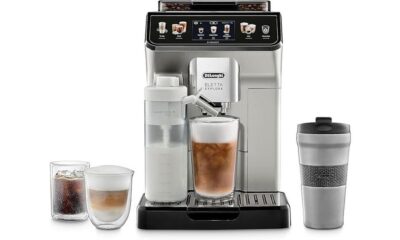
 Espresso Machines Reviews2 weeks ago
Espresso Machines Reviews2 weeks agoDeLonghi Eletta Explore: A Comprehensive Review [2025]
-

 Espresso Machines Reviews3 weeks ago
Espresso Machines Reviews3 weeks agoILAVIE 20 Bar Espresso Machine Review (2025)
-

 Espresso Machines Reviews3 weeks ago
Espresso Machines Reviews3 weeks agoSUMSATY Espresso Machine Review (2025)
-
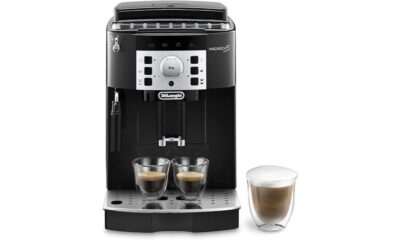
 Espresso Machines Reviews2 weeks ago
Espresso Machines Reviews2 weeks agoDeLonghi Magnifica S ECAM22.110.B Review: A Coffee Lover's Dream [2025]
-
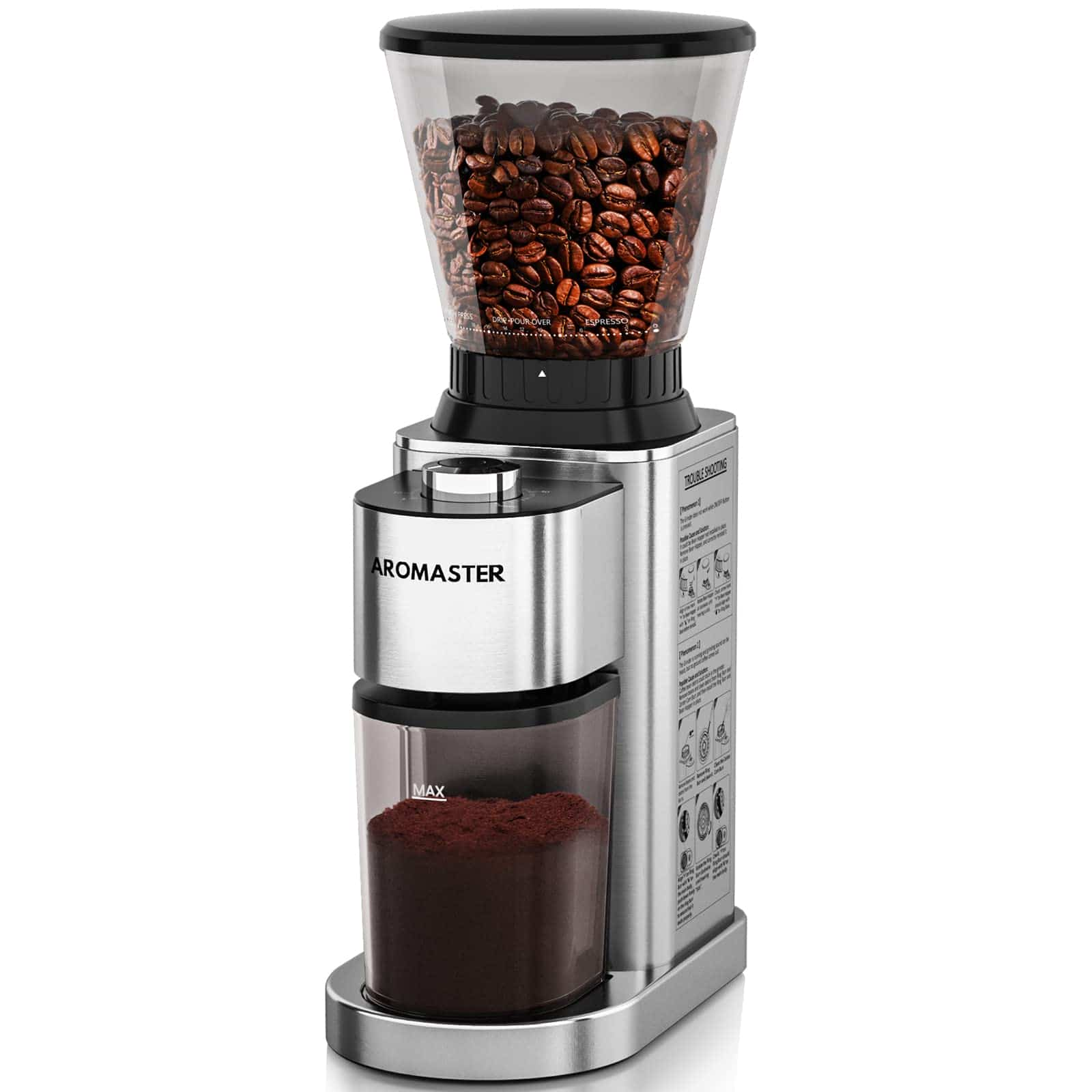
 Coffee Grinders Reviews3 weeks ago
Coffee Grinders Reviews3 weeks agoAromaster Burr Coffee Grinder Review (2025)
-

 Espresso Machines Reviews3 weeks ago
Espresso Machines Reviews3 weeks agoMAttinata Espresso Machine Review (2025)
-
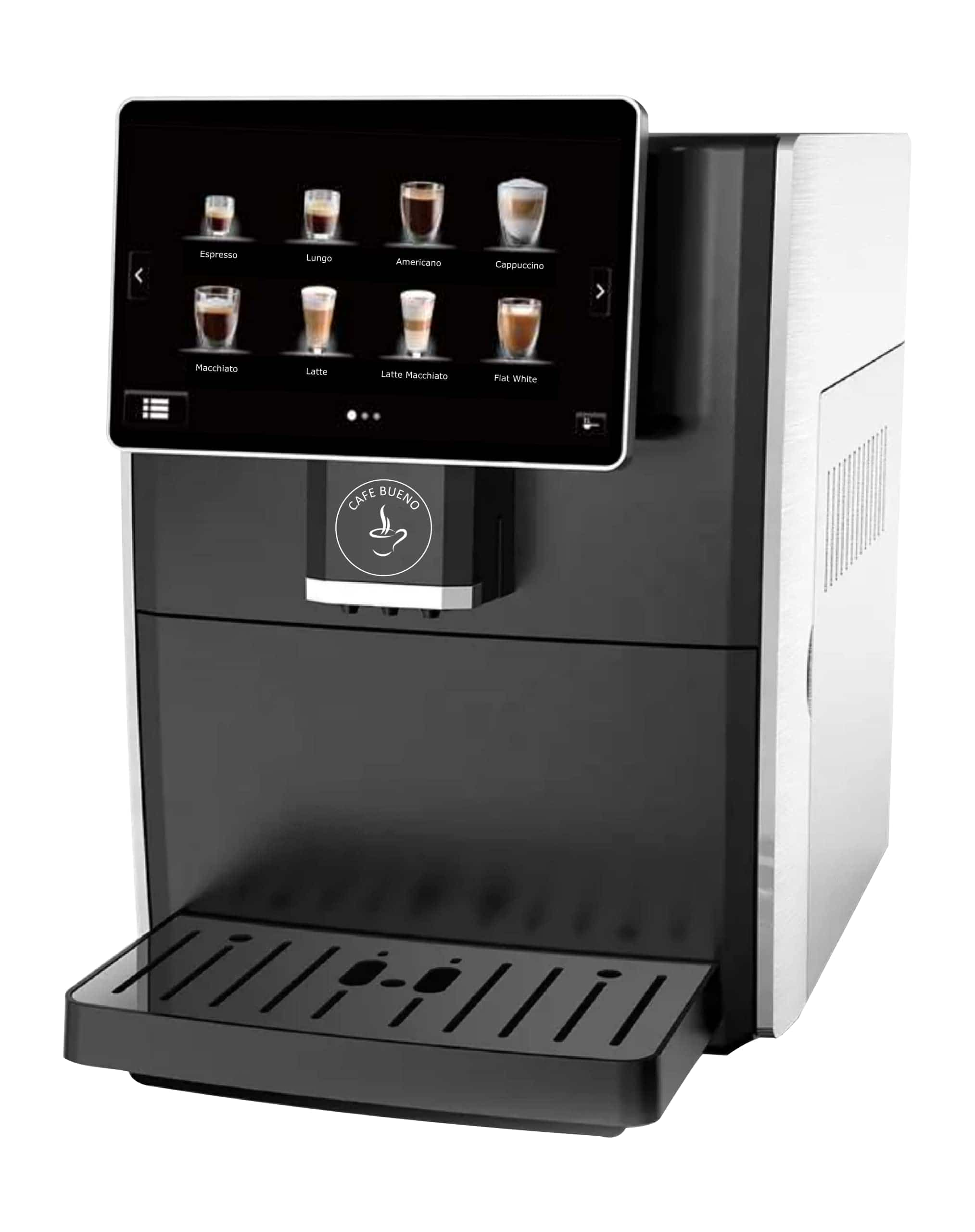
 Espresso Machines Reviews3 weeks ago
Espresso Machines Reviews3 weeks agoCafe Bueno Super Automatic Espresso Machine Review (2025)
-
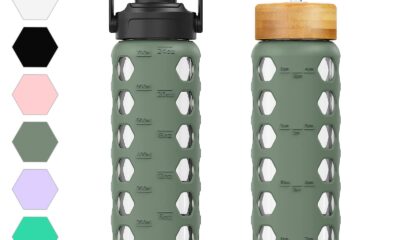
 Cappuccino Oracle Selected Reviews3 weeks ago
Cappuccino Oracle Selected Reviews3 weeks agoBest Glass Water Bottles for Eco-Friendly Hydration [2025]







